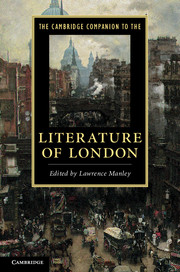Book contents
- Frontmatter
- Introduction
- 1 Images of London in medieval English literature
- 2 London and the early modern stage
- 3 London and the early modern book
- 4 London and poetry to 1750
- 5 Staging London in the Restoration and eighteenth century
- 6 London and narration in the long eighteenth century
- 7 London and nineteenth-century poetry
- 8 London in the Victorian novel
- 9 London in Victorian visual culture
- 10 London in poetry since 1900
- 11 London and modern prose, 1900-1950
- 12 Immigration and postwar London literature
- 13 Writing London in the twenty-first century
- 14 Inner London
- Guide to further reading
- Index
2 - London and the early modern stage
Published online by Cambridge University Press: 28 September 2011
- Frontmatter
- Introduction
- 1 Images of London in medieval English literature
- 2 London and the early modern stage
- 3 London and the early modern book
- 4 London and poetry to 1750
- 5 Staging London in the Restoration and eighteenth century
- 6 London and narration in the long eighteenth century
- 7 London and nineteenth-century poetry
- 8 London in the Victorian novel
- 9 London in Victorian visual culture
- 10 London in poetry since 1900
- 11 London and modern prose, 1900-1950
- 12 Immigration and postwar London literature
- 13 Writing London in the twenty-first century
- 14 Inner London
- Guide to further reading
- Index
Summary
The changing city and the commercial stage, c. 1600
It is a curious fact of London theatre history that around about 1598 playwrights quite suddenly began to write plays that in a sustained way depicted aspects of contemporary London life. London streets and London places began to be mentioned prominently in theatrical dialogue, and those familiar streets and places became the setting for stories about London economic life, the struggles among various social groups for dominance within the city, and the domestic disputes and intrigues that percolated through London households.
While prior to 1598 there had certainly been plays with scenes set in London, such as Richard III, and others, such as The Three Lords and Three Ladies of London (1590), that evoked London as a place to be redeemed from sin, nonetheless, 1598 marked a real change in how and how frequently the city was staged. Dramas such as William Haughton's Englishmen for My Money (1598) and the early comedies of Ben Jonson did not treat London as an abstract landscape populated with allegorical figures, nor did they set the occasional scene within the city; rather, they luxuriated in 'place realism', that is, in the depiction of a particular cityscape and its contemporary inhabitants. Most of these plays were comic in form, and they are generally known as city comedies, or London comedies, in recognition of the fact that they constitute a distinct subgenre of comedy in general.
- Type
- Chapter
- Information
- The Cambridge Companion to the Literature of London , pp. 34 - 49Publisher: Cambridge University PressPrint publication year: 2011



